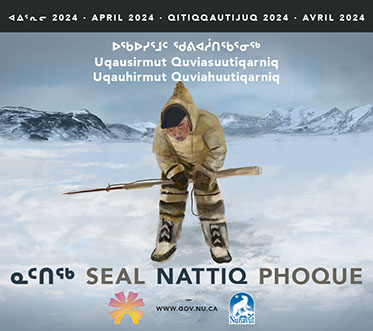PM gets Inuit-specific message
“We’re finally getting heard for what we’d like to see in Nunavut for our Inuit people”
SARA MINOGUE
Prime Minister Paul Martin said he will create a new Inuit secretariat within the Department of Indian Affairs and Northern Development, acknowledging the Liberal government’s failure to respond earlier to repeated Inuit requests for a federal body that focuses specifically on Inuit issues.
“I’ve been trying to get this since I took the helm of the ITK in 2001,” ITK president Jose Kusugak said this past Wednesday. “It is a big step for Inuit.”
Martin broke the news during his opening address at the Canada-Aboriginal Peoples Roundtable held in Ottawa this Monday.
“We’re finally getting heard for what we’d like to see in Nunavut for our Inuit people,” said Paul Kaludjak, president of Nunavut Tunngavik Inc. “It’s good to hear that and see it actually happen.”
Kaludjak was among the 70 aboriginal representatives invited to join the Prime Minister and 20 cabinet ministers for a day- long summit held on April 19.
Martin has expressed his commitment to aboriginal issues ever since he was elected leader of the Liberal party in November. This announcement marks the beginning of efforts to end what he called the “paternalistic approach” previous governments have taken towards aboriginal communities.
This time, NTI was involved in the consultation process.
“We were asked how best we can work with the government and how can we better fit into the whole process,” Kaludjak said.
While skeptics worry that Martin is more interested in politicking than real social change, Jose Kusugak, the president of Inuit Tapiriit Kanatami, has so far been impressed with Martin’s frank admission that aboriginal social conditions lag far behind those of the average Canadian.
Kusugak opened his own speech at the summit by expressing a willingness to work closely with the Martin government, characterizing the event as “a shift in the winds and tides” that would bring the Inuit, once adrift, closer to firm ground.
In the same speech, Kusugak outlined a number of areas where he wants to see change. The first is the implementation of a “partnership agreement,” an idea outlined in an ITK policy paper that says land claims agreements will only be implemented fully when there are partnerships between Inuit leaders and senior government officials.
Kusugak stressed the need for a unique approach to Inuit issues in Canada, referring to another policy paper called “The Case For Inuit Specific.”
That paper outlines the need for the government to recognize seven critical socio-economic factors that require immediate attention, including housing, education, training, employment and economic development, the environment, health, and information and communication technology.
A third paper that ITK tabled at the summit called for a reassessment of the way the government treats successfully negotiated land claims. A discussion paper titled, “A New Land Claims Implementation Policy,” suggests that governments focus only on meeting narrow legal obligations, while ignoring the broader objectives that land claim agreements were supposed to achieve.
The paper suggests that an emphasis on shared goals — such as economic development, conservation, and maintaining populations in remote areas of the country — could ensure that all Canadians as well as Inuit benefit from land claim agreements.
Kusugak pointed to the recent sovereignty patrols as just one example where Inuit contribe to matters of international concern. Arctic Inuit who are already experiencing the effects of pollution and greenhouse gas, “are also well positioned to persuade others to live up to the Kyoto protocol and to negotiate additional international agreements to reduce greenhouse gases,” Kusugak said.
The creation of an Inuit secretariat goes some way towards resolving one issue raised in the discussion papers: access to federal government officials. Inuit leaders have long argued for access to senior government members when dealing with land claim and other policy issues.
As NTI’s Kaludjak sees it, the new secretariat will be responsible for co-ordinating ties with other federal departments and agencies. Twenty senior public servants are expected to staff the new secretariat.
“We have a big role in making sure that it’s implemented right… according to the needs of our people. This is a very good chance for us to make sure it’s set up the way it should be,” Kaludjak said.
For all of Martin’s talk, many aboriginal leaders felt left out when the federal budget released in March showed little new spending on aboriginal needs, but for now, the organizational change at the federal level is being heralded as a good start.
Kaludjak, for one, was pleased with Martin’s attention to unique Inuit needs.
“We have real opportunity with the new current government to help them realize what kind of difficulties we’re facing today…” Kaludjak said.





(0) Comments